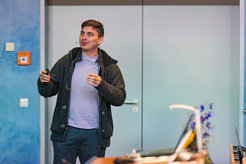Jeff Schell Prizes awarded for unraveling an assembly line in plants and a parental conflict in seeds
Dr. David Rolo and Dr. Nicolas Butel receive the Jeff Schell Prize for excellent young scientists at the Max Planck Institute of Molecular Plant Physiology
The Jeff Schell Prize of the Max Planck Institute of Molecular Plant Physiology, is awarded annually in a festive ceremony at the Max Planck Campus in Golm. This year, the Institute is honoring two young scientists, Dr. David Rolo and Dr. Nicolas Butel, for their research on the plant photosystems and endosperm.
Dr. David Rolo invented an innovative method to investigate how the complex photosynthesis apparatus in plant cells is assembled
Plants store the energy of sunlight by producing sugar from water and carbon dioxide. This vital process is called photosynthesis. To capture the energy of sunlight, plants use large protein complexes (photosystems) composed of multiple proteins and pigments. The assembly of these giant complexes is managed by assembly proteins, only a few of which have been discovered so far. Therefore, the process of assembling the large light harvesting complexes remains largely unknown.
David Rolo has developed an innovative method to identify new assembly proteins and used it to decipher the function of a new assembly protein he discovered. Plants produce the assembly proteins only when photosystems need to be assembled in a cell. Dr. Rolo's approach is based on examining the production pattern of the tens of thousands of proteins in plants to identify those that are always produced simultaneously with the few already known assembly proteins. "The idea behind this approach is that proteins that are always produced together in the different plant parts and life stages are very likely to be involved in the same process," says Rolo. Particularly exciting is that this method not only works for finding assembly proteins for photosystems but can also likely be applied to search for proteins involved in the assembly of other large protein complexes, of which there are many in plants and animals.

About Dr. David Rolo
Before his doctoral work at the Max Planck Institute in the research group Organelle Biology and Biotechnology, David Rolo studied biology at the Université François Rabelais de Tours, the Université Angers, and the Université de Strasbourg, as well as biotechnology at the École Supérieure de Biotechnologie de Strasbourg in France.
Dr. Nicolas Butel is discovered how parental conflicts affect seed development
Plant embryos draw nutrients from a tissue called endosperm during their development in the seed. In many cereals, the seeds consist largely of endosperm, thus forming the basis of our nutrition. In most flowering plants, the endosperm initially grows after fertilization without forming cell walls, which leads to the formation of a single large cell with many nuclei. Subsequently, cell walls form around these nuclei in a process known as cellularization. Without this step, the embryo cannot be supplied with the resources of the endosperm and dies. Dr. Butel revealed that the paternal genes from the pollen and the maternal genes in the endosperm engage in a conflict of interest that is crucial for the embryo's survival.
Female flowers are often promiscuous and can be pollinated by pollen from many partners. Thus, the developing seeds, each carrying genes from different fathers but the same maternal genes, compete for the limited resources of the mother plant. In many plants the endosperm does not grow after cellularization, delayed cellularization means more resources and a larger seed. Paternal genes aim to maximize resource allocation for the individual seed and therefore delay cellularization. Maternal genes strive to distribute resources evenly among all seeds. This is because only the mother is equally related to all her seeds and thus ensures the survival of all her offspring. The differing activation of paternal and maternal genes creates a balance that is crucial for the size and viability of the seeds. The results of this research allow a better understanding of how seed size is genetically regulated in crop plants, which could enable plant breeders to increase crop yields in a targeted manner.

About Dr. Nicolas Butel
Dr. Butel studied integrative biology and physiology at the University of Versailles-Saint-Quentin-en-Yvelines in Versailles and the University Pierre et Marie Curie in Paris before completing his doctoral work at the National Research Institute for Agriculture, Food and the Environment and the University of Paris XI. Since 2021, Dr. Butel has been conducting research at the Max Planck Institute for Molecular Plant Physiology in the research group Epigenetic Mechanisms of Plant Reproduction.
Jeff Schell revolutionized plant research
The namesake of the award is the Belgian molecular biologist Jozef Stefaan (Jeff) Schell (1935 – 2003). He studied zoology and microbiology at the University of Ghent, where he worked as a professor from 1967 to 1995. From 1978 to 2000, he was the director and head of the "Molecular Basis of Plant Breeding" department at the Max Planck Institute for Plant Breeding Research in Cologne.
Schell was one of the pioneers of biotechnology. As a microbiologist, he was interested in the interactions between plants and soil bacteria. In his studies on the formation and development of plant tumors, he discovered that the soil bacterium Agrobacterium tumefaciens can transfer genes to plants. Consequently, these research findings led to the targeted introduction of genes into plants using this bacterium. This method for transforming plants has since revolutionized plant research, as it allows scientists to determine the function of genes and thereby better understand metabolic processes, plant growth, and plant development.
The Jeff Schell Award was made possible by a generous donation from Targenomix, a Bayer Crop Science company.

